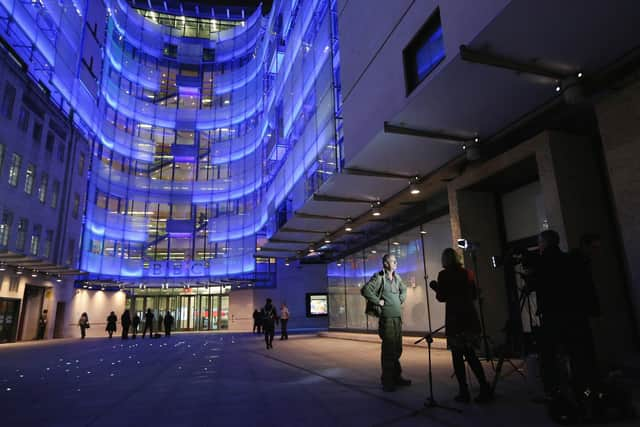The BBC seems to exclude regions and localities in our own country - David Blunkett
There are still some good features on BBC television. Some of the drama commissioned is of the highest quality and gains an audience, either directly or on catch up. Radio is a different matter.
Drama has taken a terrible hit. It is not only the quality but the banality of what is produced, specifically on BBC Radio 4. Programming, generally, could be described as ‘miserableist’. A never-ending diet of what might be described as victimhood.
Advertisement
Hide AdAdvertisement
Hide AdBBC News is not far behind in the lexicon of cuts and disaster. Of course, the BBC is not responsible for the government's decision to freeze the licence fee.


The cuts entailed, including having to take on the cost of the World Service, are being felt by all of us on a daily basis.
News and current affairs are now so narrow in scope, that once you've listened to BBC Radio News on whatever device you're encouraged to use, there is no point in tuning in for the rest of the day.
Instead of investing in regional and local programming, and then transferring the interesting stories and news items to the national platform, the BBC are simply chopping at the roots, which will inevitably result in the tree itself dying.
Advertisement
Hide AdAdvertisement
Hide AdSome decisions are challenged. Mainly those that have a substantial backing from the more powerful – those with a voice and an interest. That is why the decision to drop the BBC Singers was reversed.
But if the BBC is to fulfil its Charter requirements of Information, Education and Entertainment, then culture must surely be part of this.
So here we are in Yorkshire, with a population just slightly larger than Scotland, but with investment and coverage by the BBC which is frankly risible. Media City, over the Pennines in Salford, gives coverage to the north-west; whilst some programming has been transferred to Cardiff, we, east of the Pennines derive no benefit from any of this so-called decentralisation.
In essence, the BBC is highly metropolitan and southern-based, in which diversity seems to exclude regions and localities in our own country. The coverage on BBC television news last Sunday of street parties reached only as far north as Northamptonshire.
Advertisement
Hide AdAdvertisement
Hide AdAs an avid supporter of the BBC, it breaks my heart. Which is why the appointment of a new Chair, following the demise of Richard Sharp and his connections with Boris Johnson and the Conservative Party, is so important.
It is blindingly obvious that adapting to the new digital era and the way that younger people access their information and entertainment must be taken into account in policy for the future.
Yet as I've pointed out personally to the Director-General of the BBC, Tim Davie, you don't attract young people by trashing programmes that the existing listenership enjoy, because the ones you're trying to attract with the very different programming are not listening in the first place.
Which is why all the attention on whether the next Chair of the BBC will have political connections is so irrelevant. Of course, they will have political views.
Advertisement
Hide AdAdvertisement
Hide AdThe idea that there are people out there with real and relevant experience, who do not have views of their own, or who might have had some connection with a political party in the past, is nonsense.
The issue is whether they have enough vision and competence to be able to chair the existing governance arrangements and understand how to guide the BBC at a time when its future is in danger.
They will need to avoid destroying the brand by dumbing down instead of delivering high-quality programming, reliable and extensive news and current affairs.
In my younger days I fancied the idea of becoming the chair of the BBC. Don't worry, I’m over the idea.
Advertisement
Hide AdAdvertisement
Hide AdFirstly, I am, of course, ‘political’ and although I believe I'm an independent spirit, I've always been a ‘political animal’.
Secondly, who's going to appoint someone who can't see to run the BBC, when mistakenly they would believe that I would have to ‘watch’ the programmes to be aware of whether they are any good or not.
But thirdly, I've probably missed the boat. Whilst it is true that someone of my age chairs the regulator, Ofcom, and I still believe I have a major contribution to make in the public arena, a chair of the BBC who laughs every time one of the BBC's jingles enjoins us all to watch television through iPlayer, or to listen through BBC Sounds, is probably not going to get through the scrutiny process.
Despite the eye watering cuts, the reduction in commissioning budgets which are squeezing out talent, ideas, and quality, I still believe the BBC is a profoundly important institution in a world where so much around us is disintegrating.
Advertisement
Hide AdAdvertisement
Hide AdThe trick is surely to bring about change at a pace that carries your existing audience with you whilst seeking to move with the times, and to live in a world where something as old-fashioned as a radio (yes, an actual radio), is confined to a car, or to the home of us oldies.
David Blunkett is a Labour Party politician, and served as the MP for Sheffield Brightside and Hillsborough.